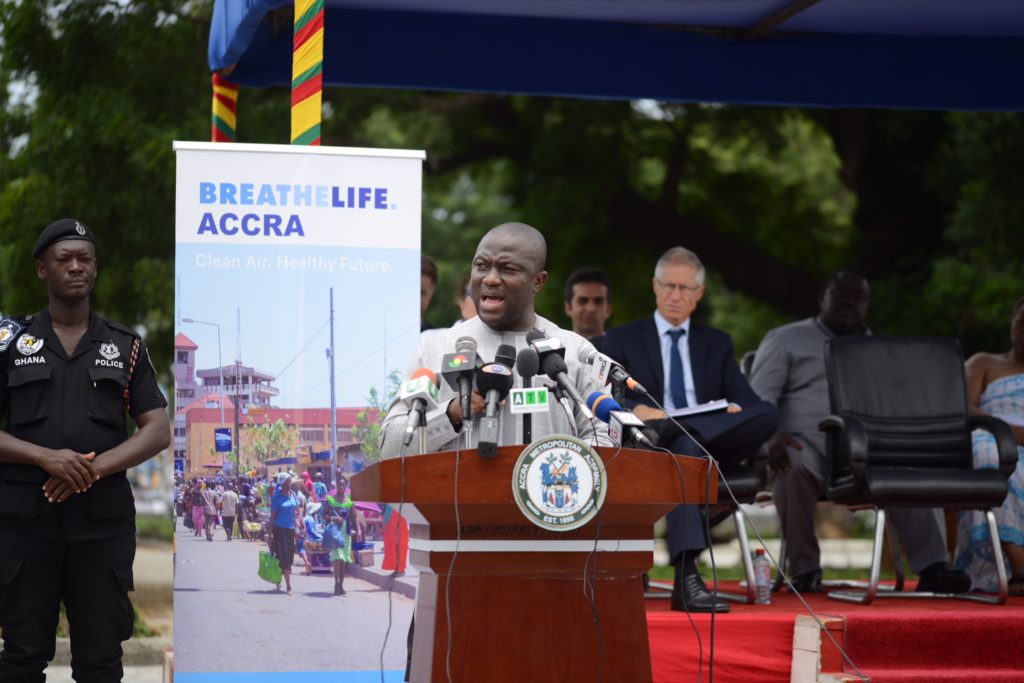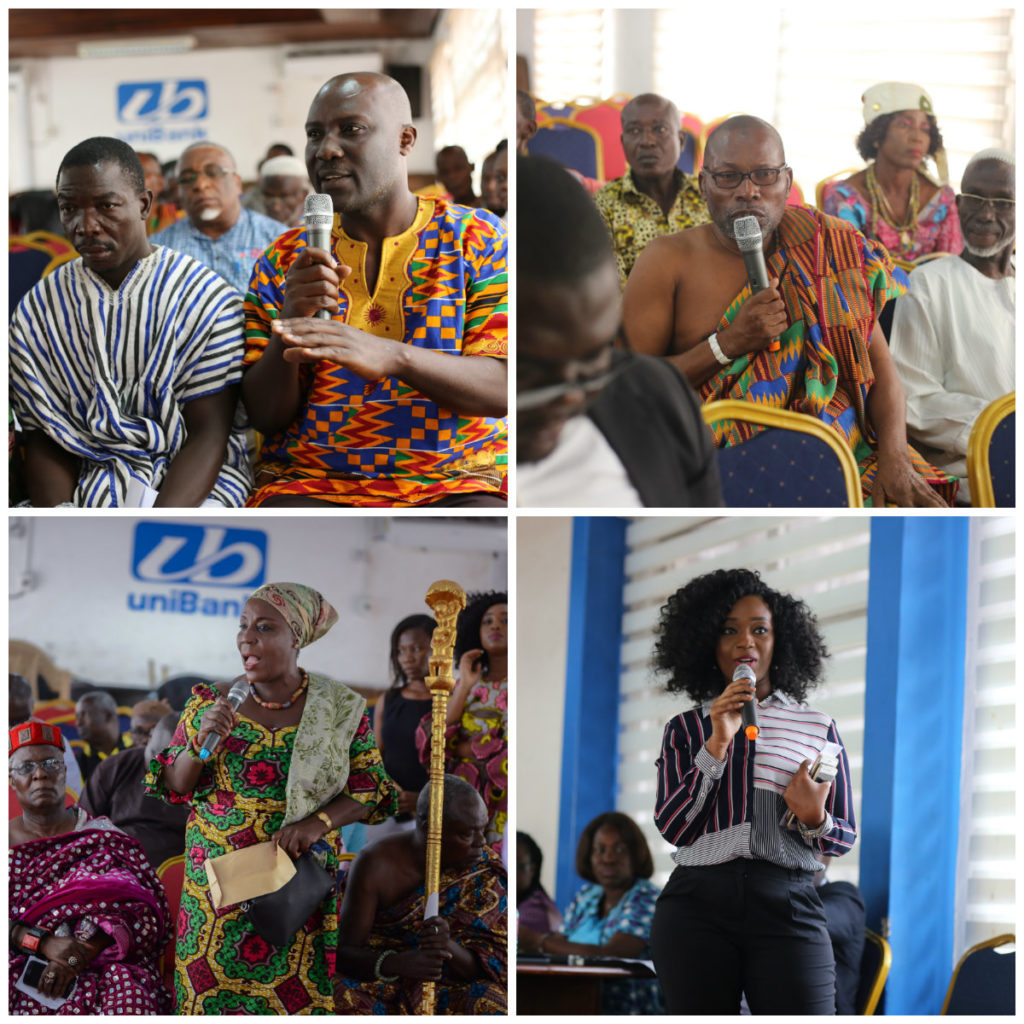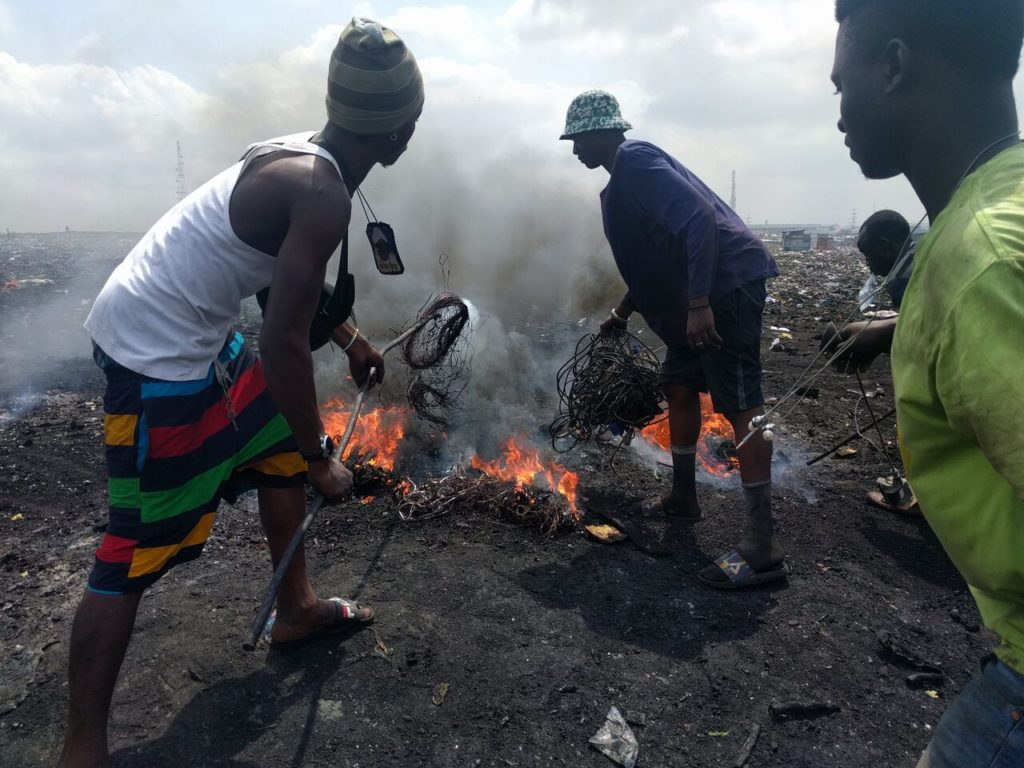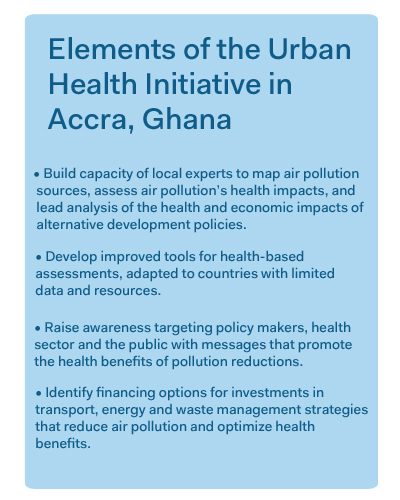
Mayor of Accra, the honourable Mohammed Sowah, at the campaign launch event.
Accra, Ghana, home to 2 million people, is the first major African city to join the BreatheLife campaign.
The announcement coincided with the launch of several bold new City initiatives to clean up waste, stop waste burning and enhance green spaces in several neighbourhoods worst hit by air pollution.
“Cities are becoming more important in the geopolitical space. In our part of the world, air pollution is not prioritized as a health concern — even in the way we cook,” said the Mayor of Accra, Mohammed Adjei Sowah.
“But the statistics are so staggering that we have to wake people up to take action. We have to talk about it loudly so that it becomes part of our discourse in the urban political space,” he said.
The awareness-raising campaign is supported by a new Urban Health Initiative, led by Ghana Health Services and the World Health Organization to build the capacity of Ghanaian experts to assess the impacts of air pollution and plan healthier development alternatives.
Accra is the first pilot city of the Urban Health Initiative, supported by UN Environment’s Climate and Clean Air Coalition.
These City-based initiatives also coincide with efforts by the Ghana Environmental Protection Agency (Ghana EPA) to develop a new air quality management plan for the Greater Accra region, including stricter national standards for fuel and vehicle quality (see this story for details).
According to the latest World Health Organization data, an estimated 28,210 Ghanaians died prematurely in 2016 as a result of exposure to air pollution. Accra’s average annual air pollution levels are about five times the WHO guideline average for the most health-damaging fine particles of PM.2.5., according to data released by Ghana EPA.

Accra community residents and City government representatives discuss air pollution issues at a recent stakeholder meeting leading up to the BreatheLife campaign launch. Photos by Kobby Blay.
Household and ambient air pollution are thus among the top environmental health threats facing the country. Young children are plagued by a high rate of childhood pneumonia, due to spending long hours near wood and charcoal cookstoves. Older people bear the brunt of other air pollution-related diseases, such as heart attack, lung cancer and stroke.
However average annual air pollution levels are also strongly influenced by peaks experienced during seasonal dust storms, say WHO experts. During other months of the year, Accra’s air quality is higher — with good potential for achieving even better results if city and national authorities can take firm action.
In joining the BreatheLife campaign, Accra cited its key air pollution priorities as including:
• Efficient mass transit and safe walking and cycling paths;
• Improved wastewater treatment as well as collection, separation and disposal of solid waste;
• Industrial emissions control, building energy efficiencies, and healthier food production.
All of these also reduce air pollution directly or indirectly.
The City-supported community campaigns (see sidebar for more details) will focus first on two sub metropolitan areas: Ashiedu Keteke (Jamestown, Agbogbloshie), and Ablekuma South (Mamprobi, Chorkor), and include Community durbars, (festive gatherings) including noted Ghanain musicians or sports figures.
Ghana Health Services and the World Health Organization will work with local health workers to improve awareness and training about the importance of switching to clean cookstoves, and protecting mothers and children from household smoke.
Other activities will be focused at schools, where there will be promotion of green spaces and better waste management through art competitions, fun-games, and peer education. There will also be house-to-house sensitization to encourage residents to stop burning waste and call available collection services. Volunteer households will take part in pilot waste segregation/recycling or composting initiatives.
Awareness-raising is one aspect of the three-pronged Urban Health Initiative.
The Urban Health Initiative, which also involves UN Habitat and ICLEI-Local Governments for Sustainability, is building capacity in the health sector and other sectors to formulate scenarios for reducing air pollution-related deaths as well as deaths from injuries and other urban hazards that tend to be produced by the same unsustainable development policies.
“We need to make the health impacts of air pollution visible, in a way that is precise and visible to policymakers and the public,” said Deputy Program Manager, Ghana Health Service, Dr Carl Osei.
“It’s not like malaria– we see malaria, we feel it. The impacts are not very visible with air pollution. They are very nuanced. You have to convince the people, and you have to use evidence to convince them. In terms of evidence in the local setting, not much has been done in that area,” he said.

Young men burning waste to retrieve precious metals in Agbogbloshie, one of the world’s largest e-waste dumps. Photo by Abraham Mwaura/WHO
“Air pollution is a major health problem, particularly in cities, but so are other non-communicable diseases that stem from sedentary lifestyles,” said World Health Organization Ghana country representative, Dr Owen Kaluwa. “There are solutions available now that yield potential multiple benefits for human health. Ensuring that these are given due consideration involves giving the health sector the tools and capacity to quantify all co-benefits in ways that are meaningful to policy and personal decision-making processes.”
A key element of the Urban Health Initiative is to link environmental data on air pollution to health data about premature mortality as well as hospitalization costs.

“Health data is an important driving factor in policy,” notes Emmanuel Appoh, head of Environmental Quality at Ghana EPA, which is a lead partner along with Ghana Health Services, in the process.
“In the last two decades, Ghana has made a number of successful interventions driven by environmental and human health-based research,” he adds, citing lead phase-out as a key example.
“Back in 2003, after research showed that levels of lead in human blood and in soil were far above than acceptable limits at the time, Ghana banned the use of lead in fuel immediately, even though Africa had five years to phase it out,” he said.
The initiative is funded through a grant from the Climate and Clean Air Coalition (CCAC). “We welcome Accra into the growing BreatheLife network. Their efforts to integrate air quality and climate mitigation actions will benefit not just the health and well-being of Ghanaians but also contribute to global efforts to limit warming to well under two degrees Celsius, this century.” Helena Molin Valdés, Head of the Climate and Clean Air Coalition Secretariat.
Remarks from ICLEI and UN Habitat partners:
“Urban planning and design can make or break a city’s liveability. Optimal solutions in these densely-populated spaces like Accra can bring great benefits to large numbers of people; but to get to these optimal solutions, we need to be able to quantify all the benefits of action and costs of inaction, while understanding the needs of individual communities,” said UN HABITAT’s Sebastian Lange.
“Tackling air pollution is key to improving local health, reducing the incidence of short-lived pollutants, and slowing emissions-driven climate change. This is a benefit to everyone, but making a change requires engagement from every level of government,” said Maryke van Staden, Manager of ICLEI’s Low Carbon City Programme and Director of the Bonn Center for Local Climate Action and Reporting (carbonn Center), which also manages the carbonn Climate Registry, for measurement, reporting and verification of local climate mitigation actions.
“For their part, local governments hold unique opportunities – and responsibilities – for implementing air pollution and climate action solutions,” she added.
Follow Greater Accra’s clean air journey here.
Banner photo by Joana Ansong/WHO.
